Biden lands in Israel: ‘Connection between Americans and Israelis is bone deep’
US president says he plans to discuss two-state solution; Lapid calls him one of Israel’s greatest-ever friends; Herzog: He’s a ‘visionary and a leader’
US President Joe Biden landed at Ben Gurion Airport on Wednesday for his first trip to Israel as president, describing his arrival as a homecoming as he was welcomed by Israel’s leaders on the tarmac.
Biden and his Israeli hosts did their best to highlight the warmth of the relations between their two countries during the welcome ceremony.
“It’s an honor to once again stand with friends and visit the independent Jewish state of Israel,” Biden began in his prepared remarks before several dozen high-profile guests seated in bleachers.
But while these enjoyed the shade of an awning, cabinet ministers were given no protection from the sun in 85-plus degree Fahrenheit heat. Instead, they were placed on a slightly elevated stage that was apparently was left unshaded in order to maintain the lighting necessary for a group photo with Biden and his top aides at the end of the ceremony.
Hailing the ties between the two countries, Biden added, “The connection between the Israeli people and the American people is bone deep. Generation after generation, that connection grows. We invest in each other, we dream together.”
Biden will spend 48 hours in Israel and the West Bank with an itinerary that includes bilateral meetings with Israeli leaders, tours of Israeli security systems and the Yad Vashem Holocaust memorial museum, attendance at the opening ceremony of the Maccabiah Jewish Olympics, a visit to a hospital for Palestinians in East Jerusalem and a meeting with Palestinian Authority President Mahmoud Abbas in Bethlehem. He will then fly directly to Saudi Arabia to participate in a summit of regional Arab leaders known as the GCC+3 before returning to the US on Sunday.
It is Biden’s tenth trip to Israel, and he used his remarks to fondly recall his first visit just before the Yom Kippur War in 1973 when Golda Meir was premier and former prime minister Yitzhak Rabin was one of her aides.
“I realized that I had the great honor to be part of the great history of this country,” he said, before reiterating another go-to Israel line of his. “I’ll say it again, you need not be a Jew to be a Zionist.”
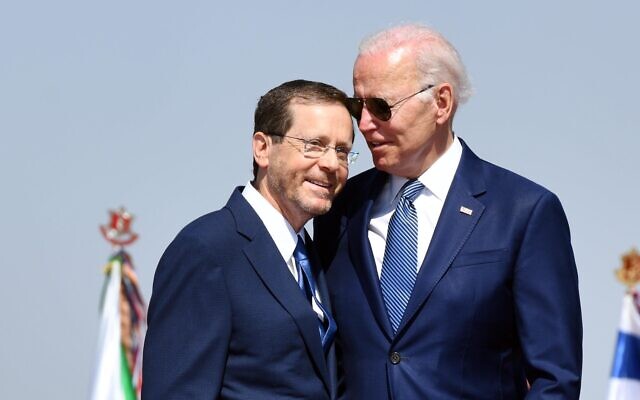
The US president used a considerable part of his five-minute speech to emphasize the importance of Holocaust education, noting that his father “imbued in us a sense of obligation” to never forget the horrors of the Nazi genocide.
He went on to pledge to “fight the poison of antisemitism wherever it rears its ugly head.”
Biden notably made no mention of Iran in his remarks, though he did say that advancing Israel’s integration into the region would be a theme of the trip. Israel is eager to move toward normalizing relations with Saudi Arabia as it seeks to further cooperate with regional partners in order to combat Iran.
Israel opposes the US effort to resurrect the Iran nuclear deal, though it has pursued a less confrontational approach to lobbying against it since former prime minister Benjamin Netanyahu left office a year ago.
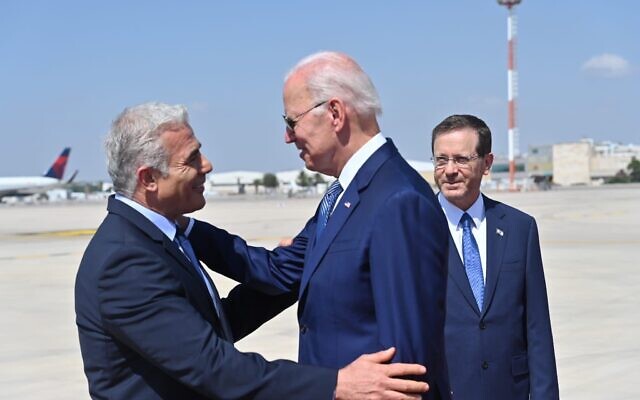
US National Security Adviser Jake Sullivan told reporters en route to Israel that Biden would convey to Jerusalem what his administration has expressed publicly until now: “There is a deal on the table… The president believes Iran should take it.”
Nuclear talks have stalled for months, though negotiators are reportedly set to reconvene for further negotiations later this month.
What Biden was careful not to avoid entirely was the Palestinian issue, saying he would raise his “continued support” for the two-state solution, even though it’s not feasible in “the near term.”
“It remains the best way to ensure a future of equal measures of freedom, prosperity and democracy for Israelis and Palestinians alike,” he said, using a favorite administration talking point on the issue.
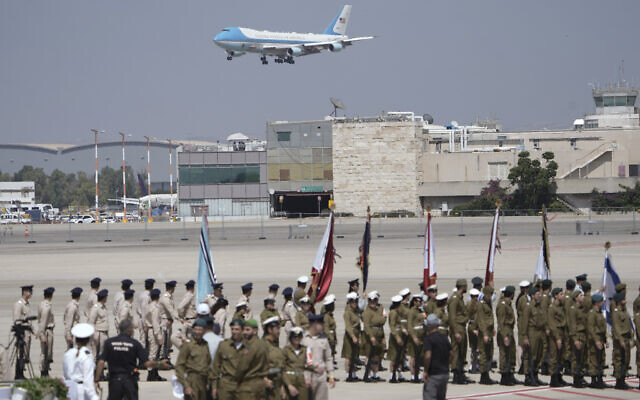
While it isn’t new, the remark was likely to disappoint Palestinians, who have called on Biden to create a “political horizon” for an eventual two-state solution and act more urgently to keep the prospect alive. While the US under Biden has restored traditional policies on the conflict such as opposition to Israeli settlements, Washington has largely eschewed major public feuds with Jerusalem, with the president convinced they have been damaging in the long run.
Upon deplaning Air Force One, Biden was greeted by Prime Minister Yair Lapid, Alternative Prime Minister Naftali Bennett and President Isaac Herzog. He resorted to fist-bumping his hosts as a COVID precaution, though he later broke protocol and shook Netanyahu’s hand, and others’.
When the trip was originally scheduled, it was Bennett who was supposed to first greet Biden on the tarmac. But plans changed last month when the Yamina chairman decided to dissolve the Knesset and allow Lapid to replace him as premier.
Bennett was still a prominent part of the ceremony, though he did not address the crowd as Lapid and Herzog did.
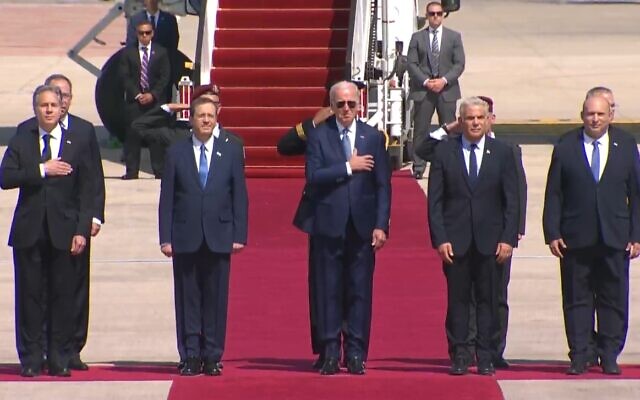
In his comments, Lapid welcomed Biden to Israel, calling him “a great Zionist and one of the best friends Israel has ever known.”
Standing on a custom-made stage on the tarmac, Lapid said the trip was “both a historic visit and a deeply personal one.”
“It is historic because it expresses the unbreakable bond between our two countries,” he said. “Our commitment to shared values: democracy, freedom, and the right of the Jewish people to a state of their own.”
He said that the visit is personal “because your relationship with Israel has always been personal.”
Lapid stressed that Israel had changed in the six years since Biden’s last visit as vice president, pointing at the country’s high-tech sector, agricultural innovation, and groundbreaking research universities.
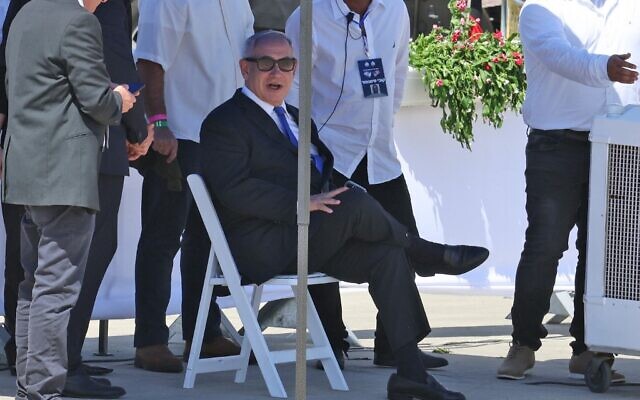
Turning to national security, Lapid said that the two leaders would “discuss building a new security and economy architecture with the nations of the Middle East, following the Abraham Accords and the achievements of the Negev Summit.”
They would also discuss “the need to renew a strong global coalition that will stop the Iranian nuclear program,” Lapid said.
“Right now, we are simply happy to see you, Mr. President,” he concluded. “The simple, genuine joy brought by seeing a good friend once again.”
Herzog adopted a decidedly biblical approach to his speech welcoming Biden, saying that “like the biblical Joseph, you are both a visionary and a leader.”
“The people of Israel welcome you to the Holy Land with open arms and joyous hearts, as Joseph son of Jacob who sought out his brothers,” said Herzog.
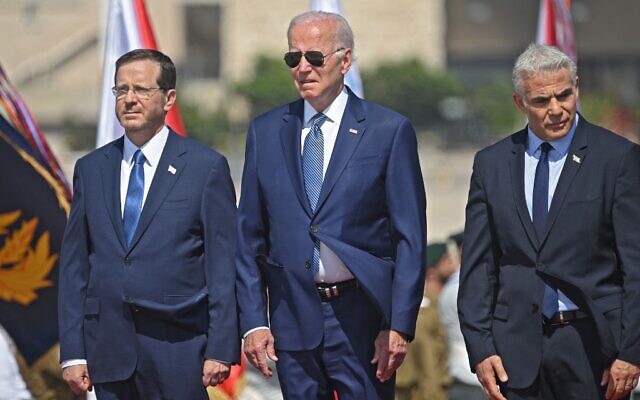
The Israeli president called his American counterpart “a true friend, and staunch supporter of Israel and the Jewish people, of our security and wellbeing, your entire life.”
He added that the visit will deal with the threats emanating from Iran that endanger the region. He also stressed the values the two countries share — democracy, justice, and freedom, tolerance, security and peace.
“The State of Israel in which you just arrived, is a successful, innovative nation, which contributes to Tikkun olam, to healing the world — through science and medicine, water and food technology, climate innovation and so much more,” he said.
Hinting strongly at the expected announcements in the coming days around growing ties between Israel and Saudi Arabia, Herzog called the trip Biden’s “journey of peace from Israel to Saudi Arabia, from the Holy Land to the Hejaz.”
After the ceremony, Herzog’s office released a statement to reporters revealing what Biden had told him upon setting foot on the tarmac.
“I am home,” Biden said, according to the Israeli readout.
“You certainly are at home, Mr. President,” Herzog replied.
Lapid used his first line to the president to lighten the mood, reminding Biden of a conversation they had eight years ago in then-vice president Biden’s office in Washington.
“You told me that if you had my hair, you would be president of the United States, and I said to you that if I had your height I would be Israel’s prime minister,” said Lapid, according to a statement released by Lapid’s office.
To Bennett, Biden was overheard saying, “Man, you did an amazing thing. You showed real courage,” in an apparent reference to the now-alternate premier’s decision to form Israel’s most politically diverse coalition ever in an attempt to break the country out of a cycle of elections. Throughout the past year, the US was careful not to push the Israeli government on a variety of issues, including its desire to reopen a US consulate in Jerusalem, due to its desire to prevent Bennett’s coalition from collapsing.
Biden also made a point of warmly greeting Netanyahu, who sat on an elevated stage with the members of Lapid’s cabinet, even though he is opposition chairman. Upon shaking his hand, Biden told the Likud chairman, “You know I love you.”
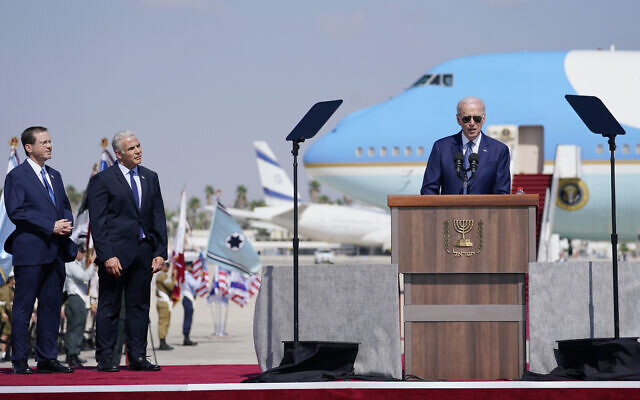
The two, who will meet again briefly on Thursday, have a rocky history, particularly during the Obama administration when Biden was vice president. Last year, Netanyahu posted a video in which he mocked Biden and regurgitated a debunked claim that the American leader had fallen asleep during an earlier meeting with Bennett at the White House.
After the ceremony Netanyahu gave a statement to reporters, calling on Biden to step up his administration’s activities against Iran.
“In order to stop regimes like Iran, economic sanctions are not enough, diplomatic sanctions are not enough,” said Netanyahu, who was not part of the official greeting ceremony for the US president. “There is no way to stop Iran without a credible military threat.”
Netanyahu said the hope was that such threats “will deter” Iran, and if not, “then there is no choice but to activate” them.
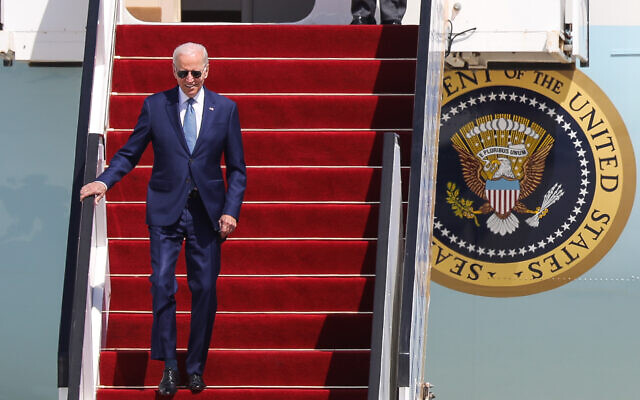
No comments:
Post a Comment